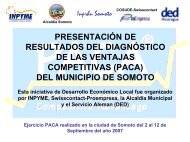BDS market development guide.pdf - PACA
BDS market development guide.pdf - PACA
BDS market development guide.pdf - PACA
Create successful ePaper yourself
Turn your PDF publications into a flip-book with our unique Google optimized e-Paper software.
2<br />
• To address poverty, governments and <strong>development</strong> agencies need to pursue a <strong>market</strong>friendly<br />
approach to <strong>development</strong>, based on sound macroeconomic management,<br />
competent delivery of public services, structural reform, and open trade.<br />
• Inherent in this approach are two implications: that government focus on its areas of core<br />
competence and that the private sector be recognized and encouraged as the prime engine<br />
of economic growth. 1<br />
• Private-sector <strong>development</strong>—of which SME <strong>development</strong> is an important part—is<br />
therefore an intrinsic part of any effective poverty-reduction strategy.<br />
Business Need for Services<br />
A focus on private-sector and SME <strong>development</strong> grows directly from <strong>development</strong> agencies’<br />
commitment to an environment promoting the private sector. Key aspects of this<br />
environment are the macroeconomic context and public investment in people. However,<br />
more immediately for SMEs, access to services is a vitally important dimension in their<br />
business environment (see Figure 1) and a key factor in determining the competitiveness of<br />
economies.<br />
• SMEs have a range of different “needs” that are critical to their survival and growth. 2 The<br />
nature of these needs will be influenced by sector and stage of SME <strong>development</strong> but will<br />
also relate to their ability to, for example, find customers, design products, enhance<br />
productivity, reduce fixed costs, improve administration, communicate effectively, and<br />
access new technology. The degree to which these needs are met will have a major<br />
influence on business success.<br />
• Although business needs differ, needs can be understood as basic, practical questions<br />
(such as how to, with whom, where to, and what about) in relation to essential business<br />
functions. These are questions faced by all businesses. Indeed, businesses, and SMEs in<br />
particular, are associated with independence. Yet, to a considerable degree, success as a<br />
small business stems from the owner–manager’s ability to manage his or her business in<br />
an interdependent manner and to develop appropriate working relationships with<br />
providers of services (and other stakeholders) in the environment.<br />
• Financial services are a critical part of this immediate environment but cannot meet all<br />
business needs.<br />
• Environments that are conducive to SME <strong>development</strong> provide relevant, differentiated<br />
services to meet these needs on an informal or formal basis.<br />
1<br />
Economic growth is not seen as a guarantee of poverty reduction but as a necessary condition for it.<br />
2<br />
Needs are concerned with inputs to (administration, people, technology) and outputs from (access to <strong>market</strong>s,<br />
customers) SMEs.<br />
Microenterprise Best Practices<br />
Development Alternatives, Inc.














